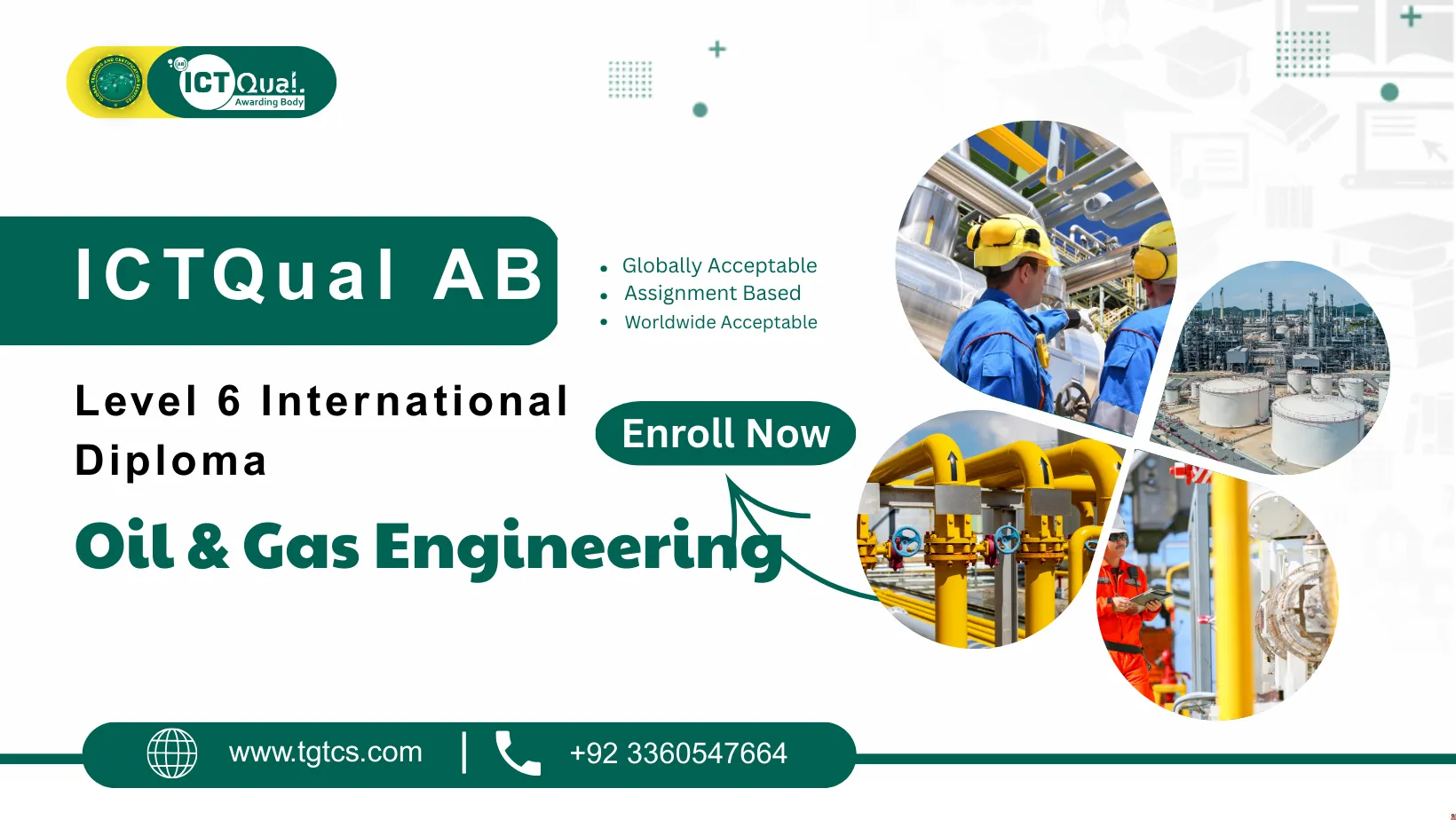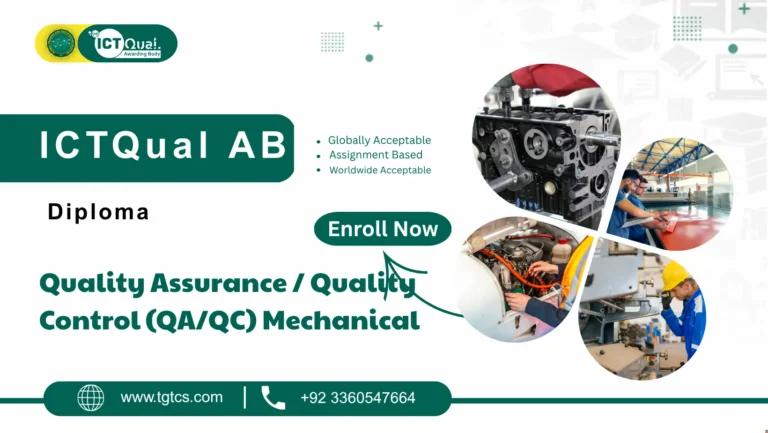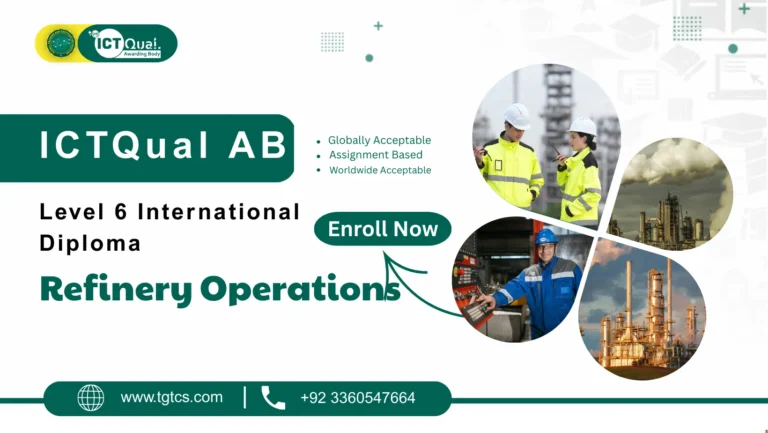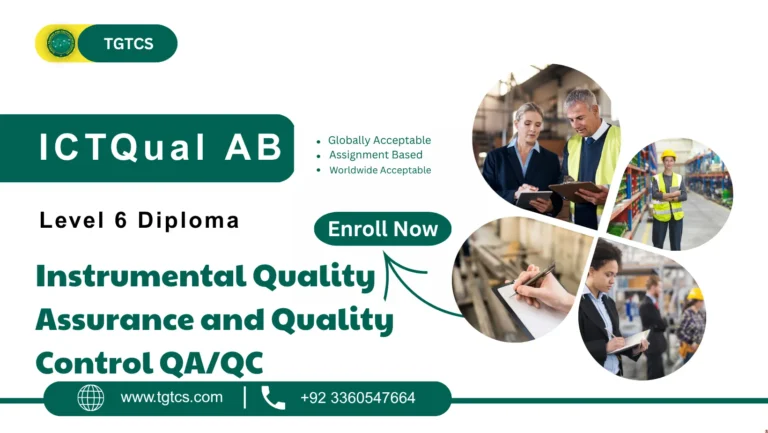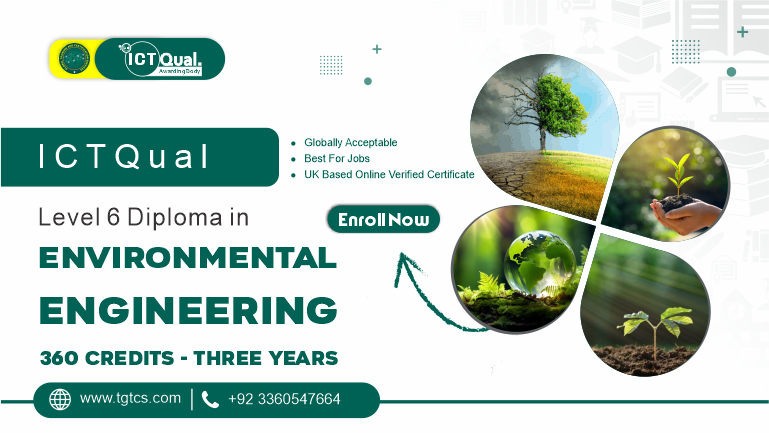ICTQual AB Level 6 International Diploma in Oil & Gas Engineering
The oil and gas industry stands as a cornerstone of the global energy sector, driving economic growth and technological innovation. As the world transitions towards sustainable energy solutions, the demand for skilled professionals in oil and gas engineering continues to rise. The ICTQual AB Level 6 International Diploma in Oil & Gas Engineering is meticulously designed to equip learners with the advanced knowledge and practical skills required to excel in this dynamic field.
This comprehensive three-year, 360-credit qualification delves into the core aspects of petroleum engineering, encompassing both upstream and downstream operations. The curriculum covers a broad spectrum of topics, including drilling and well engineering, reservoir management, pipeline engineering, process design, and energy management. Emphasizing safety, efficiency, and sustainability, the program integrates theoretical learning with hands-on experience, preparing learners for real-world challenges in oil and gas engineering.
Throughout the course, learners will develop proficiency in using industry-standard tools and simulation software, enabling them to analyze complex engineering problems and devise effective solutions. The program also fosters critical thinking, project management, and leadership skills, essential for advancing in technical and managerial roles within the energy sector.
Graduates of this diploma will be well-prepared to pursue careers as drilling engineers, reservoir engineers, production managers, and energy consultants. With a globally recognized qualification, they will have the opportunity to contribute to the advancement of the oil and gas industry, ensuring the responsible and efficient utilization of energy resources.
The Global Training and Certification Services is Approved Training Centre of ICTQual AB UK Ltd
Start your professional journey with the ICTQual AB Level 6 International Diploma in Oil & Gas Engineering, a globally recognized qualification that provides advanced skills and knowledge for careers in the oil and gas industry.
Flexible, Assignment-Based Learning
- Fully 360-credit program, entirely assignment-based.
- Learn at your own pace from anywhere in the world.
- Ideal for fresh graduates as well as experienced professionals.
International Recognition
- British Council verifiable, ensuring global credibility.
- MOFA and Embassy attestable, suitable for international documentation.
- Highly valued for career advancement, job opportunities, and Iqama approval.
Suitable for Fresh Learners
- Complete 36 mandatory assignments within three years.
- Gain comprehensive knowledge in drilling, well engineering, reservoir management, pipeline engineering, process design, and energy management.
Fast-Track Option for Experienced Professionals
- Submit verifiable evidence of 6+ years of relevant work experience.
- Demonstrate expertise in professional discussion meetings with an ICTQual AB Approved Assessor.
- Achieve certification without completing all mandatory assignments, saving time while recognizing prior learning.
Career-Enhancing Skills
- Develop advanced technical and analytical skills in oil and gas engineering.
- Gain leadership, project management, and problem-solving capabilities.
- Prepare for roles such as drilling engineer, reservoir engineer, production manager, and energy consultant.
By completing the ICTQual AB Level 6 International Diploma in Oil & Gas Engineering, learners will gain a globally recognized qualification that empowers them to advance their careers, achieve professional credibility, and excel in the competitive energy sector.
Mandatory Unit
This qualification, the ICTQual AB Level 6 International Diploma in Oil & Gas Engineering, consists of 36 mandatory units.
Year 1 – Foundation in Oil & Gas Engineering
- Principles of Oil & Gas Engineering
- Introduction to Petroleum Exploration and Production
- Drilling and Well Engineering Fundamentals
- Construction Materials and Methods in Oil & Gas Projects
- Process Engineering Basics
- Project Planning and Scheduling in Oil & Gas Engineering
- Health, Safety, and Environmental Awareness in Oil & Gas
- Communication and Stakeholder Management in Energy Projects
- Digital Tools and Simulation Software in Oil & Gas
- Financial Management in Oil & Gas Projects
- Quality Assurance and Control in Engineering Operations
- Legal and Regulatory Frameworks in Oil & Gas
Year 2 – Intermediate Oil & Gas Engineering Practices
- Advanced Drilling Techniques and Well Operations
- Resource Management and Allocation in Oil & Gas Projects
- Process Design and Optimisation
- Pipeline and Infrastructure Engineering
- Procurement and Supply Chain Management in Energy Projects
- Project Risk Analysis and Mitigation
- Leadership and Team Management in Engineering Projects
- Offshore and Onshore Operations Management
- Sustainability and Environmental Management in Oil & Gas
- Project Monitoring and Reporting in Engineering Projects
- Problem-Solving and Decision-Making in Oil & Gas Projects
- Communication and Negotiation Skills in Energy Projects
Year 3 – Advanced Oil & Gas Engineering and Strategic Leadership
- Strategic Oil & Gas Project Management
- Advanced Production and Reservoir Engineering
- Energy Systems and Infrastructure Planning
- Innovation and Emerging Technologies in Oil & Gas
- Advanced Risk and Crisis Management in Engineering Projects
- Contract Management and Legal Compliance in Energy Projects
- Leadership in Oil & Gas Projects
- Advanced Project Control and Performance Measurement
- Project Governance and Compliance in Oil & Gas Operations
- Research Methods and Project Analysis in Energy Engineering
- Capstone Project in Oil & Gas Engineering
- Professional Development and Career Planning
The ICTQual AB Level 6 International Diploma in Oil & Gas Engineering equips learners with the advanced technical knowledge, practical skills, and strategic expertise required to excel in the global oil and gas industry.
Year 1 – Foundation in Oil & Gas Engineering
Principles of Oil & Gas Engineering
- Understand fundamental concepts and terminology in oil and gas engineering.
- Explore upstream and downstream operations in the energy sector.
- Learn core engineering principles applied to petroleum projects.
- Apply theoretical knowledge to practical engineering scenarios.
Introduction to Petroleum Exploration and Production
- Gain insight into the exploration lifecycle and production methods.
- Understand reservoir identification, drilling, and extraction processes.
- Learn the basics of geoscience applications in petroleum exploration.
- Explore operational challenges in upstream oil and gas projects.
Drilling and Well Engineering Fundamentals
- Understand drilling processes, well design, and safety considerations.
- Learn techniques for efficient and safe well operations.
- Apply fundamental engineering calculations in drilling projects.
- Evaluate risks associated with drilling and well management.
Construction Materials and Methods in Oil & Gas Projects
- Identify materials used in oil and gas construction projects.
- Understand construction methods for pipelines, rigs, and facilities.
- Learn to select materials based on durability, cost, and safety.
- Apply sustainable and efficient construction practices.
Process Engineering Basics
- Understand process flow, unit operations, and energy systems.
- Learn fundamentals of chemical and mechanical processes in petroleum.
- Apply process calculations to real-world oil and gas projects.
- Optimize operational efficiency using basic process engineering principles.
Project Planning and Scheduling in Oil & Gas Engineering
- Develop project plans with clear objectives, timelines, and milestones.
- Apply scheduling tools and techniques to oil and gas projects.
- Monitor progress and manage project resources effectively.
- Identify and resolve project delays and operational bottlenecks.
Health, Safety, and Environmental Awareness in Oil & Gas
- Understand regulatory and safety requirements in oil and gas operations.
- Implement environmental protection and sustainability measures.
- Develop safety management plans for projects.
- Identify hazards and apply risk reduction strategies.
Communication and Stakeholder Management in Energy Projects
- Build effective communication with teams, clients, and stakeholders.
- Manage stakeholder expectations and resolve conflicts.
- Develop reporting and presentation skills for professional settings.
- Enhance collaboration across multidisciplinary project teams.
Digital Tools and Simulation Software in Oil & Gas
- Use industry-standard digital tools for project analysis and simulation.
- Apply software to model drilling, production, and process systems.
- Analyze data to support engineering decisions.
- Improve operational efficiency using digital technologies.
Financial Management in Oil & Gas Projects
- Understand budgeting, cost estimation, and financial analysis.
- Monitor project costs and optimize resource allocation.
- Apply financial models to evaluate investment feasibility.
- Make informed financial decisions for project success.
Quality Assurance and Control in Engineering Operations
- Implement QA/QC procedures in oil and gas projects.
- Monitor compliance with industry standards and regulations.
- Identify and correct operational deficiencies.
- Maintain high-quality standards across project activities.
Legal and Regulatory Frameworks in Oil & Gas
- Understand laws and regulations governing petroleum operations.
- Apply knowledge of contracts, compliance, and safety regulations.
- Navigate international standards and local legal requirements.
- Manage legal risks in oil and gas engineering projects.
Year 2 – Intermediate Oil & Gas Engineering Practices
Advanced Drilling Techniques and Well Operations
- Apply advanced drilling methods for efficiency and safety.
- Analyze well design and optimize drilling performance.
- Understand offshore and onshore drilling operations.
- Implement best practices for risk reduction in drilling projects.
Resource Management and Allocation in Oil & Gas Projects
- Plan and allocate manpower, equipment, and materials efficiently.
- Monitor resource utilization to reduce waste and costs.
- Optimize workflow and productivity in energy projects.
- Apply sustainable practices in resource management.
Process Design and Optimisation
- Design and optimize energy processes for maximum efficiency.
- Apply simulation and modeling techniques in process engineering.
- Evaluate process performance and implement improvements.
- Integrate safety and environmental considerations into process design.
Pipeline and Infrastructure Engineering
- Understand the design, construction, and maintenance of pipelines.
- Analyze pipeline integrity, flow dynamics, and operational efficiency.
- Apply engineering principles to oil and gas infrastructure projects.
- Implement safety and regulatory compliance measures.
Procurement and Supply Chain Management in Energy Projects
- Plan procurement strategies for materials, equipment, and services.
- Manage supply chain operations for onshore and offshore projects.
- Evaluate supplier performance and ensure quality standards.
- Apply cost-effective and timely procurement solutions.
Project Risk Analysis and Mitigation
- Identify potential risks in oil and gas projects.
- Assess operational, financial, and environmental risks.
- Develop mitigation strategies and contingency plans.
- Monitor risk management effectiveness throughout project lifecycle.
Leadership and Team Management in Engineering Projects
- Develop leadership skills for managing multidisciplinary teams.
- Apply effective team management and delegation techniques.
- Resolve conflicts and enhance team collaboration.
- Foster a productive and safe working environment.
Offshore and Onshore Operations Management
- Understand operational procedures in both offshore and onshore environments.
- Manage logistics, safety, and workforce efficiency.
- Implement compliance with industry regulations and standards.
- Optimize operational performance and resource allocation.
Sustainability and Environmental Management in Oil & Gas
- Implement sustainable practices in energy projects.
- Monitor environmental impact and regulatory compliance.
- Develop strategies for waste reduction and energy efficiency.
- Integrate sustainability principles into project planning.
Project Monitoring and Reporting in Engineering Projects
- Track project progress using KPIs and milestones.
- Prepare detailed reports for stakeholders and management.
- Identify deviations and recommend corrective actions.
- Ensure timely delivery and quality of project outputs.
Problem-Solving and Decision-Making in Oil & Gas Projects
- Analyze complex engineering challenges effectively.
- Apply structured problem-solving methodologies.
- Make informed decisions based on data and stakeholder input.
- Evaluate outcomes and implement continuous improvement.
Communication and Negotiation Skills in Energy Projects
- Develop professional communication strategies with stakeholders.
- Negotiate contracts, agreements, and project resources effectively.
- Resolve conflicts and build long-term professional relationships.
- Present technical information clearly for decision-making purposes.
Year 3 – Advanced Oil & Gas Engineering and Strategic Leadership
Strategic Oil & Gas Project Management
- Develop strategies for managing complex oil and gas projects.
- Align project objectives with organizational goals and industry standards.
- Implement effective project monitoring and performance evaluation.
- Apply leadership and decision-making skills for strategic outcomes.
Advanced Production and Reservoir Engineering
- Analyze reservoir characteristics and optimize production strategies.
- Apply advanced techniques in well performance and production management.
- Evaluate recovery methods and reservoir efficiency.
- Integrate engineering principles to maximize resource utilization.
Energy Systems and Infrastructure Planning
- Plan energy systems for oil, gas, and integrated energy projects.
- Design infrastructure for efficiency, safety, and sustainability.
- Assess environmental, technical, and economic impacts.
- Implement best practices in energy system management.
Innovation and Emerging Technologies in Oil & Gas
- Explore advanced technologies such as digital oilfield tools, IoT, and AI applications.
- Implement innovative solutions to improve project efficiency and safety.
- Evaluate emerging trends and their impact on the oil and gas industry.
- Apply technology-driven approaches to solve operational challenges.
Advanced Risk and Crisis Management in Engineering Projects
- Identify, analyze, and mitigate high-level operational risks.
- Develop crisis management strategies for emergency scenarios.
- Implement safety and contingency measures in critical projects.
- Monitor risk control effectiveness to ensure project resilience.
Contract Management and Legal Compliance in Energy Projects
- Manage contracts, agreements, and regulatory compliance.
- Understand international and local legal frameworks in oil and gas.
- Resolve disputes and ensure project adherence to laws and standards.
- Maintain ethical practices in all contractual engagements.
Leadership in Oil & Gas Projects
- Develop advanced leadership capabilities for complex project management.
- Mentor teams and promote collaboration across departments.
- Enhance strategic decision-making and problem-solving skills.
- Lead projects to achieve operational and business objectives.
Advanced Project Control and Performance Measurement
- Implement project control systems to monitor costs, schedules, and quality.
- Analyze performance metrics to optimize project outcomes.
- Apply corrective actions to ensure objectives are met efficiently.
- Evaluate project efficiency and effectiveness using KPI analysis.
Project Governance and Compliance in Oil & Gas Operations
- Ensure adherence to governance frameworks and corporate policies.
- Monitor compliance with industry standards and environmental regulations.
- Promote transparency and accountability in project management.
- Maintain professional and ethical operational practices.
Research Methods and Project Analysis in Energy Engineering
- Conduct research on energy markets, technologies, and operational trends.
- Apply analytical methods to evaluate project performance and feasibility.
- Develop data-driven insights for strategic decision-making.
- Integrate research findings into practical engineering solutions.
Capstone Project in Oil & Gas Engineering
- Plan and execute a major project integrating all learned concepts.
- Apply practical, analytical, and strategic skills to solve real-world challenges.
- Demonstrate comprehensive knowledge in oil and gas engineering.
- Present findings professionally to stakeholders and assessors.
Professional Development and Career Planning
- Develop a personalized career roadmap in oil and gas engineering.
- Identify opportunities for professional growth and specialization.
- Enhance leadership, networking, and lifelong learning skills.
- Prepare for senior roles in energy companies, consultancy, and project management.
Start your professional journey with the ICTQual AB Level 6 International Diploma in Oil & Gas Engineering and gain the knowledge, skills, and credentials required to excel in the global energy sector. This qualification is designed to provide both fresh graduates and experienced professionals with advanced expertise in oil and gas engineering.
Comprehensive Technical Knowledge
- Acquire in-depth understanding of drilling, production, reservoir, and pipeline engineering.
- Learn process design, energy systems planning, and advanced project management techniques.
- Understand health, safety, and environmental regulations in the oil and gas industry.
Practical Skills and Industry Applications
- Gain hands-on experience using industry-standard simulation and digital tools.
- Apply theoretical knowledge to real-world engineering problems and projects.
- Develop analytical, problem-solving, and decision-making skills relevant to oil and gas operations.
Career Advancement and Global Recognition
- Enhance job prospects in roles such as drilling engineer, reservoir engineer, production manager, and energy consultant.
- Benefit from a qualification that is British Council verifiable, MOFA and Embassy attestable.
- Suitable for Iqama approval, international career opportunities, and senior leadership roles.
Flexible, Self-Paced Learning
- Complete a fully assignment-based program at your own pace from anywhere in the world.
- Fresh learners complete all 36 assignments within three years, while experienced professionals may fast-track certification via professional discussions.
- Balance professional, personal, and academic commitments effectively.
Strategic Leadership and Professional Development
- Develop leadership, project control, and stakeholder management skills.
- Gain expertise in risk management, governance, and compliance.
- Prepare for senior roles in energy companies, consultancy, and large-scale engineering projects.
By completing the ICTQual AB Level 6 International Diploma in Oil & Gas Engineering, learners will be fully equipped to excel in the energy sector, advance their careers, and gain internationally recognized credibility in oil and gas engineering.
Start your journey with the ICTQual AB Level 6 International Diploma in Oil & Gas Engineering by understanding who will benefit most from this advanced qualification. This course is designed for learners aiming to gain practical skills, technical knowledge, and international recognition in the oil and gas sector.
Aspiring Oil & Gas Engineers
- Acquire foundational and advanced knowledge in drilling, reservoir, and production engineering.
- Prepare for entry-level roles or technical positions in oil and gas operations.
Energy Project Managers and Supervisors
- Enhance expertise in project planning, risk management, and operational efficiency.
- Learn to manage multidisciplinary teams and large-scale energy projects effectively.
Investors and Industry Consultants
- Understand oil and gas production, infrastructure, and financial analysis.
- Apply practical knowledge to evaluate investment opportunities and optimize resources.
Fresh Graduates and Career Starters
- Gain internationally recognized certification at your own pace through a fully assignment-based program.
- Build strong technical and leadership skills to enter the competitive oil and gas industry confidently.
Experienced Professionals Seeking Recognition
- Validate prior experience via fast-track certification with professional discussion assessments.
- Gain global accreditation suitable for career advancement, job opportunities, and Iqama approval.
By completing this course, learners will be fully equipped to excel in the oil and gas industry, advance their careers, and achieve internationally recognized professional credibility.
Course Overview
Course Level
Level 6
Course Units
36 Units
Credits
360
Duration
3 years
